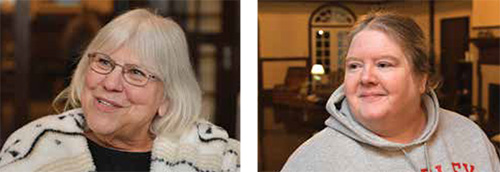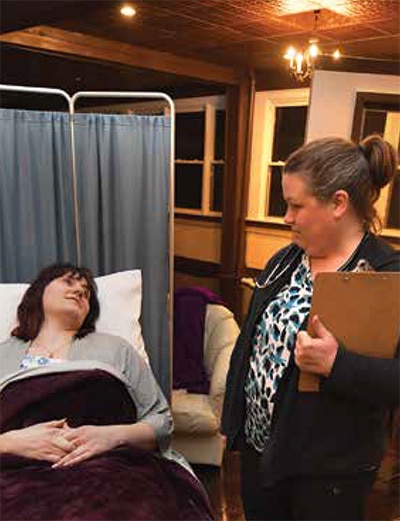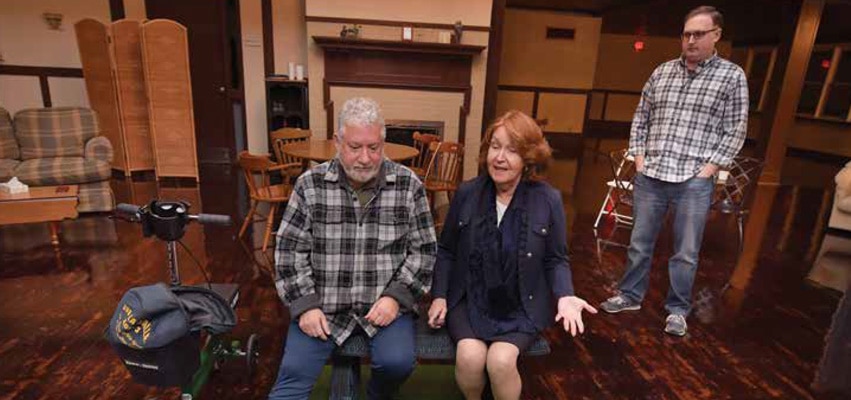It’s a cool evening in March when a woman named Joy receives a second chance at life.
After waiting on a donor list, Joy is getting a new heart.
 Nearly 60 people have gathered to be part of this moment. Before it’s done, 240 will have shared Joy’s journey via the Chillicothe Players Theatre’s intimate and moving production of The Tin Woman by Sean Grennan.
Nearly 60 people have gathered to be part of this moment. Before it’s done, 240 will have shared Joy’s journey via the Chillicothe Players Theatre’s intimate and moving production of The Tin Woman by Sean Grennan.
The play, a dramedy based on a true story, uses humor and pathos to examine human connection, grief and self-worth.
With these messages, the Chillicothe based cast and crew of 13 could improve the lives of 18,000 people through their partnership with Gift of Hope Organ and Tissue Donor Network.
Gift of Hope is a not-for-profit organization that coordinates organ and tissue donation in Illinois and Northwest Indiana. That means evaluating donors for medical suitability and connecting recovered organs with recipients, but it also means providing support for donors’ families, working with doctors and hospitals throughout their roles in the process, and educating the public about registering for donation.
Across the country, different regions are focused on improving the organ donation process in different ways. New England is testing pilot programs to connect electronic patient records with registration records in organ donation databases to save valuable time in the transplant process. In Wisconsin, researchers are working on extending organ preservation time and increasing viable donor pools.
Nationally, deceased-donor transplants are up 22 percent over just five years ago, thanks to a unified transplant network. In Illinois, the focus is on finding innovative ways – such as this play — to connect audiences with information to increase donor registration. Such outreach may be the best hope for the 26,000 Illinoisans awaiting organs to extend their lives.

“I immediately saw the connection,” says Helen Engelbrecht, the Chillicothe Players Board member who was instrumental in putting the theater and Gift of Hope together.
She was looking for a way to “reach the community beyond entertainment. We contacted Gift of Hope and they said there are just times you need a venue to let people know.”
After each performance of The Tin Woman, a volunteer ambassador from Gift of Hope spoke to the audience about the local impact of organ donation. Ambassadors are organ recipients or donor family members. Rod McDonald, a double-lung recipient, was one. After 10 years on medication, McDonald’s doctors told him a hereditary lung disease that had gone undiagnosed in his mother and grandfather had left him in need of a transplant. The disease left him unable to walk more than three steps without an oxygen tank.
Five years post-transplant, McDonald now honors the memory of his donor, Tristen Scholly, by attending as many Gift of Hope events as possible. He still carries a picture of the 21-year-old Chicagoan who gave him a new life.
“Donors select their recipients, in my opinion,” McDonald says. “You never know who is going to receive your organs. It could be your waiter, a police officer, or a member of your family.”
According to Organdonor.gov, one donor can save up to eight people and enhance the health of 75 more. It’s not just about receiving lungs, as McDonald did, or a heart like Joy does in The Tin Woman. Each registered donor also is offering to help someone in need of tissue for a skin graft, or a cornea to help them see.
As a result, Chillicothe Players’ four sold-out shows could impact an impressive number of people.

Mary Ellen Milem’s father wasn’t so lucky. Milem, the play’s assistant director, said her father was initially on a heart transplant list but was determined too ill for the procedure. He died without receiving the organ he needed. For Milem, that made it even more important to be part of the outreach in both the theater and donor communities.
“My hope is (that) by seeing the show, maybe folks will donate or change their mind about donating,” she said. “Folks who hadn’t considered it before will see what it does for people.”
Lisa Dodson, Gift of Hope’s community outreach specialist, agreed that this approach can be very effective in dispelling myths and misconceptions about who is eligible to register for donation.
“If your wish is to be a donor, your job is to register and to talk to your family,” Dodson said. “The worst thing is for your family to hear about this on the day of a tragedy. Our job is to assess. Don’t try to figure that out yourself. We’ll take folks down that path.”
Dodson attends a dozen or more Illinois High School Association events each year to share this message with the 16- and 17-year-olds now allowed to register for organ donation through the “Drive for Life” Law passed in Illinois in 2017. She and her co-workers travel to speak at Peoria Rivermen hockey games, health fairs, leadership luncheons, anywhere there’s a chance to reach people with the message. April is especially busy with events for National Donate Life Month.
“It’s really an ensemble,” cast member Lindsey Griffith said both of the play and the mission. “There is no small part.”
For more information about National Donate Life Month events or becoming an organ donor, visit www.GiftofHope.org.
Laurie Pillman is an author and freelance writer/editor, based in Peoria.




